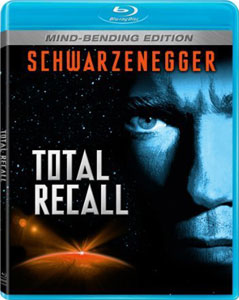Broadly speaking, there are three kinds of Philip K. Dick adaptations: Those that are faithful to his themes while switching the medium to movies (“Blade Runner,” “Minority Report”), those that are so faithful they come off too rigid (“A Scanner Darkly,” “Radio Free Albemuth”), and those that launch an action movie from a PKD premise (even though PKD almost never wrote action sequences). “Total Recall” (1990) introduces us to this most ubiquitous type of adaptation.
A good movie starts a bad trend
As is often the case with movies that launch an annoying trend, “Total Recall” itself isn’t horrible. Writers Ronald Shusett and Dan O’Bannon (both from “Alien”) and Gary Goldman stick close to the concept of the short story “We Can Remember It For You Wholesale” (1966): Douglas Quaid (Arnold Schwarzenegger) regularly dreams of Mars, so he goes to Rekall to get memories of a Mars vacation implanted into his brain. The memory-implanting technicians run into a roadblock because Quaid has already had his mind overwritten. Somewhere in there is his true memory of being a secret agent on the Red Planet.
In the film’s coolest “idea moment,” Quaid learns that he’s not really Quaid, because Quaid is an artificial personality implanted into a real person named Hauser. Joss Whedon would later build a whole series around the concept of personalities uploaded into blank-slate brains with “Dollhouse.” Not as twisty and incomprehensible as I had feared, “Total Recall” undeniably gets juice out of “Wholesale’s” core concept, and one could even make a case that it goes deeper than PKD’s short story.

“Total Recall” (1990)
Director: Paul Verhoeven
Writers: Philip K. Dick, Ronald Shusett, Dan O’Bannon
Stars: Arnold Schwarzenegger, Sharon Stone, Michael Ironside
But is it a PKD movie in tone? Well, it gets off on the wrong foot with me by misspelling PKD’s name in the opening credits (“Phillip”). Arguably, though, the aesthetic of director Paul Verhoeven and his design team does overlap with PKD’s sensibilities. This was no doubt an expensive film, but it looks cheap – like early “Star Trek” or “Lost in Space” more so than “Star Wars” or “Alien,” and nowhere near the lushness of “Blade Runner.”
“Total Recall” is filled with bland, clean corridors and gains some color with its matte paintings, but even then I thought “Nice matte painting.” In its defense, the flat look fits, because PKD – who generally didn’t write about landscape or architectural details — wrote this story in the era of cheap-looking SF films.
That said, this feels like a Verhoeven film more than a PKD film. “Total Recall” presents a cold, cruel future, not only via the monopolist Cohaagen (Ronny Cox) selling air on Mars and keeping its people in poverty, but also through people cursing at each other and killing each other in orgies of guts and gore.

Differences between the auteurs
While PKD presents bleak futures, his villains tended to lack the mustache-twirling evil of Cohaagen. The wry humor of the two auteurs likewise differs: PKD finds absurdity in mundane life; Verhoeven leans toward big and silly statements. It’s a fine line, but someone familiar with both PKD and Verhoeven will see this is the latter’s film.
Schwarzenegger gives the best performance in the sense that he’s totally in step with what the director wants. Indeed, the notion of Arnold being a Dickian Sad Sack is patently absurd, so his extreme performance – from writhing in the memory-implant chair to screaming “Screw you!” as he kills a bad guy with a giant drill – is appropriate.
Pairing nicely with PKD’s mind-bending story, Rob Bottin, ILM and their teams deliver memorable special effects, notably the face of a villain exploding in the open (lack of) atmosphere on Mars, and our heroes Quaid and Melina (Rachel Ticotin) almost going through the same thing.
Sometimes the effects are show-offy, like the iconic shot of the face of a large woman opening in slices to reveal Quaid underneath. When we eventually learn how convoluted this scheme was from the beginning, moments like this seem especially stagey and unnecessary. Also, the action isn’t choreographed very well, as Verhoeven seems content with minimal takes.
Still, despite those moments where the filmmakers slow down to show off their special effects, “Total Recall” has momentum that makes it easy to watch even though you know – and the director doesn’t care if you know – you’re watching a ridiculous movie. If you’re viewing the PKD adaptations in order, this will be a big letdown after “Blade Runner.” But at least PKD’s story isn’t subsumed by the sound and fury, and we’ll later learn the PKD-inspired action catalog can be worse than this.

